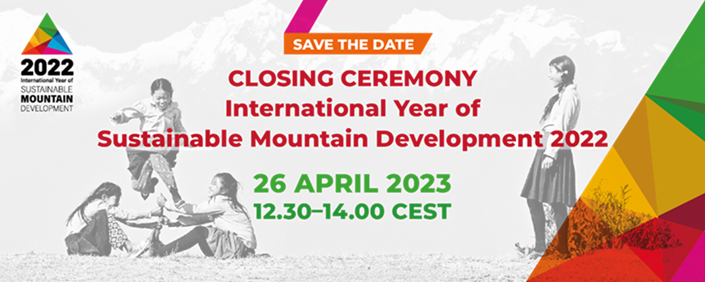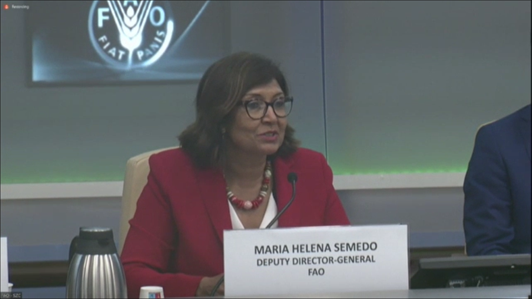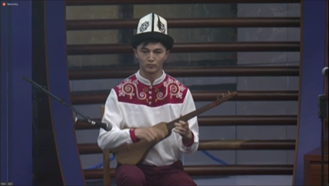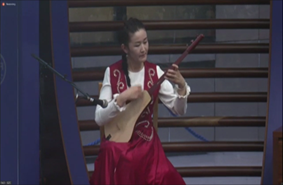

On April 26, 2023, at 6:30 am EST, Zhimin Wu, Director of the Forestry Division, FAO began the closing ceremony of the International Year of Sustainable Mountain Development 2022 as the event's moderator. He conveyed that 2022 has been a momentous year of monitoring International Sustainable Mountain Development. UN General Assembly adopted a special resolution related to dedicating the next 5 years to Mountains. The Speakers present at the Ceremony are devoted to building a road map that is dedicated to building an ecosystem in the mountains and strengthening the resilience of mountain peoples.

Zhimin Wu, Director of the Forestry Division, FAO
Next, the Ceremony began with a welcome speech from UN Secretary-General Antonio Guterres. He thanked the Mountain Partnership for its support throughout 2022 and congratulated the Government of Kyrgyzstan for its tireless efforts in promoting greater attention to mountains. This year was successful in placing the mountain ecosystem and resilience at the heart of the International System and we have seen it through UNGA proclaiming “ Five years of Action for the Development of Mountain Regions” between 2023 and 2027. This is a fantastic opportunity to focus on the

UN Secretary-General Antonio Guterres
mountains and it's 1 Billion inhabitants who call the mountains and the precious ecosystems as their home. The Roadmap which will be discussed today is the first step of the next journey. He ended his short speech by reassuring all that the UN will continue to support sustainable mountain development led by the FAO.
“Mountains are our origin and Mountains are our solutions”, this was a very deep line that the next speaker, the Director General of FAO, Qu Dongyu believes in. He spoke on how the FAO is dedicated to taking on all the projects, programs, and initiatives to support and lead all the activities related to mountain and mountain development. Also maintains the mandate of the global mountain agenda.

Director General of FAO, Qu Dongyu
Even though the ceremony of the International Year of Sustainable Mountain Development 2022 is coming to an end, it opens a successful window to focus on the mountains. As a Scientist, he expressed his view on evolution and how Homo Sapiens originated from monkeys/apes who live in the forests/mountains, that is why he states the line of origin and solutions at the beginning. We can only expect solutions from the least explored regions to our potential future and to the situations we are in now: one is the mountains and another ocean. There is no denying that mountains are absolutely necessary to preserve the sustainability of our planet. 60 High-level events were organized in 2022 organized by the private and public sectors and key partners to create the awareness of importance of sustainable mountain development, 2030 agenda, and SDGs. During these events, several mountain policy briefings were exchanged to support science-policy dialogue. He also thanked the government of Kyrgyzstan for its central and leading role in this sustainable mountain agenda. Also, he thanked the government of Andorra, Italy, and Switzerland for their extended support to the mountain partnership secretariat.
He also expressed that Mountains are not only the water towers of the world but also the homeland for biodiversity as well as Indigenous culture, their knowledge, and genetic species of several crops which are disasters resistant. We should not forget Mountain hosted Human beings and sustained them for several centuries. This fragile community is vulnerable and faces poverty, hunger, marginalization, the effects of climate change and also biodiversity loss. Almost half of the rural population in the globe lives in the areas of land degradation and food insecurity.
An example of the support towards mountain communities from FAO is in Peru and the Philippines. Together with the Ministry of Japan, the FAO project aims to improve the resilience of mountains and improve community capacities by helping them with watershed management approach and land use management and also in other parts of the global mountain wherein they helped in disaster risk reduction and building resilience, sustainable tourism together with UN Worl Tourism Organization. FAO is also trying to gather the data and information thus understanding the mountains and identifying the areas which need concentration related to tourism especially related to concrete initiatives promoted this year.
FAO is fully supporting the members who are committed to the Five years of action plan of SMD and implement the recommendations put forth by member states particularly related to water management. FAO is fully affiliated with the projects and initiatives particularly supporting women, youth, and vulnerable communities, and ensures that No one will be left behind.
The Kyrgyz Republic is one of the key countries leading the mountain agenda and also an active member of the mountain partnership. H.E. Zheenbek Kulubaev, Minister for Foreign Affairs, Kyrgyz Republic video message was then played wherein he addressed all the participants by speaking of how Sustainable Mountain Development was adopted by the UN at the initiative of President of Kyrgyz Republic Mr.Sadyr Zhaparov. Kyrgyzstan has been working on gaining the world’s attention to mountain regions for the past 25 years and it also has been one of the priorities of Kyrgyz foreign policy. Inhabitants in the mountain regions face threats related to climate change, food security, poverty, marginalization, and inaccessibility to the most basic essentials like healthcare and education.

H.E. Zheenbek Kulubaev, Minister for Foreign Affairs, Kyrgyz Republic
In regard to the Five years of action plan for the development of mountain regions, the minister invited all of the international stakeholders and partners to jointly develop a global action plan for UNGA’s resolution’s practical implementation. After all, the consequences of inaction will affect all countries without exception The problems faced by the mountain communities should not be anymore considered as their own but should be taken up by the entire global community as we all are obligated to protect and preserve the mountains and their ecosystem for the future generations as well.
Next, First Deputy Minister of Foreign Affairs of the Kyrgyz Republic, Asein Isaev, shared his views on mountains. He thanked the UNSG, UNGA, all the mountain partners, and associated institutions for supporting the Kyrgyz Republic's proposed mountain initiative. He spoke on how the people of the 21st century have an obligation to preserve mountain ecosystems for future generations, especially in Kyrgystan where 90% of the demographic is mountainous and has been actively working since early 2000 to attract the world community to mountain issues. Mountains are the key priority in Kyrgyzstan’s mountain policy and together with the help of UN, Kyrgyzstan is working towards SMD very actively as said in the Five year of action plan for the development of mountain region resolution which has been adopted by UNGA this December. Kyrgyzstan has already been working on the roadmap for the implementation of this resolution.

First Deputy Minister of Foreign Affairs of the Kyrgyz Republic Asein Isaev
Despite the steps taken on this agenda, some mountain countries have limited access to the most basic necessities in these vulnerable regions. This is why it's high time to take up this problem and support the world community. It requires full-fledged support from the international organization in conquering this feat, especially from the UN’s FAO Director General Qu Dongyu.
The principality of Andorra has been a driving force along with a coalition with governments for advocating mountains with UNFCCC. Maria Ubach, Minister of Foreign Affairs of Andorra took up the floor next. She said that 2022 marked an important year for the Mountains in improving the resilience of mountain communities in the face of global climate change. She expresses her concern about how fragile biodiversity and natural resources are adversely affected in the mountainous regions of Andorra due to climate change effects.
She also mentions about rainfall deficit in the region wherein last September the precipitation was 51% below the average. This is having negative consequences on the country’s agriculture and biodiversity. The International years of SMD have proven to be helpful in increasing awareness among people and also increasing the importance of the conservation of mountains at the global level. She stresses how it's vital now to join forces to implement concrete actions. As an active state member of the Mountain Partnership, Andorra also organized last year an informal ministerial meeting on climate actions on the mountains in the framework of COP 27 in Egypt.

Maria Ubach, Minister of Foreign Affairs of Andorra
During this meeting, all the state parties of the Mountain Partnership advocated for their contribution to the conservation of mountain ecosystems by elevating the mountain issues to the global. Political agenda. They have also pushed Mountain Agenda to be in the plenary for the COp 28. She is grateful that the UNFCCC secretariat has conveyed that the mountain agenda will be made inclusive in the 58th UNFCCC subsidiary bodies meeting which will take place in Bourne and she urges the state parties to support this during the event. Alliance is the only way to mobilize the Five years of action plan along with policies and investments in this area that could definitely build synergies with internationally agreed SDG. She ended her speech by saying that Mountains matter for the people and the planet.
Zoritsa Urosevic, Executive Director of the UN World Tourism Organization (UNWTO) was the next speaker who shared her perspective on the mountains. She says that SMD and Tourism go hand in hand. Tourism is an economic lifeline for many communities in mountain regions at the same time tourism can also help protect this fragile mountain ecosystem. According to her, there is no better occasion than this ceremony for rethinking mountain tourism and understanding its benefits better. UNWTO is pleased to have joined FAO and Mountain Partnership secretariat on the new study of how Mountain tourism can account for 16% of world tourism. There is no denying that tourism is a key sector for economic diversification and preserving the rich biodiversity of mountains.

Zoritsa Urosevic, Executive Director of the UN World Tourism Organization
This research also shows important gaps in UNWTO data. Addressing the planning of tourism and its visitors will be much better whilst building new products which can help local communities. UNWTO is currently developing a statistical framework for measuring tourism by using harmonized metrics for all three dimensions of sustainability viz economic, social, and environmental. UNWTO’s best tourism initiatives (of which half of them are in mountainous areas) celebrate these areas where tourism is making real differences. They are also promoting wine tourism and gastronomy tourism in important areas of development. She congratulated Mountain Partnership on completing 20 years of its formation and the Government of Kyrgyzstan as well on its work to make 2023- 2027 five years of action for mountain development and ended her speech by saying they can definitely count on UN WTO for the betterment of mountains.
Italy is not only the main founding donor of the Mountain Partnership Secretariat but also the chair of the Mountain Partnership steering committee. The next speaker, Permanent Representative of Itay to FAO, Ambassador Bruno Archi spoke on how tourism needs to be protected to be enhanced. He quotes a famous line from an Italian explorer who wrote about the Monte Blac - an Italian mountain that says “Mountains are sturdy and powerful but their ecosystem is deeply and strongly vulnerable. They are highly vulnerable to adverse and negative impacts like deforestation, climate change, natural disasters, and land degradation.”

Permanent Representative of Itay to FAO, Ambassador Bruno Archi
Global warming is the most adverse challenge we have to face. Acrding to him, Italy is blessed with Mt. Alps which is why it explicitly mentions in its constitution’s article 44, the need of sheltering and protecting the mountains at the local, regional, and national levels. But there is a need for coordination to protect them at the international level. Mountain Partnership was founded 20 years ago, and now along with its 460 members strives to work on sustainability in all three dimensions of the mountain regions. 340 Million people who live in rural and mountainous areas globally are susceptible to food insecurity.
He also focused on the importance of solving the long-term problems which the mountain communities face it requires holistic approaches to solve them by inculcating mountain-specific policies into national sustainable development strategies by increasing the efforts to curb poverty and inequality in all its forms and dimensions by managing food insecurity and malnutrition, promoting conservation and sustainable use of biodiversity, by diversifying crops and nutritional diets and by fighting against disaster risks and land degradation in mountain areas. It also requires huge investment to promote mountain tourism, environmental protection and generate socio-economic benefits for local communities, and also to promote local indigenous culture and products. Mr. Ambassador says that to address multiple challenges of mountainous countries, Five years of the action plan for mountain development initiative is essential and concluded his speech.
Peru is also a mountainous country and a long-standing active member of the Mountain Partnership. The next speaker, H.E. Julio Eduardo Martinetti Macedo, Permanent Representative of Peru to FAO spoke of how the Andes Range in Peru and sustainable development in mountains in general is one the priorities for Peru. Peru like any other mountainous country has huge cultural and environmental biodiversity and climate change has not spared Peru’s mountains like any other in the world. There are high levels of poverty prevalent in Peruvian rural areas.

H.E. Julio Eduardo Martinetti Macedo, Permanent Representative of Peru to FAO
One of the major problems is glacier melting which has increased in recent decades affecting the people at high Andes Basins and putting the water supply at great risk for the people who live at the lower coastal basins. To come up with a collective solution, Peru along with other Andean Mountain countries are working hand in hand. Peru has made major headway in supporting the 2023-2027 Action Plan roadmap to strengthen governance and conduct more in-depth research regarding these vulnerable points which require immediate attention. At the closing of this IYM 2022, Mr. Ambassador concludes his talk on converting that the government of Peru is dedicated to improving the policies, and sustainable management of the mountain ecosystems focusing on adapting to climate change, preserving genetic resources, and managing water resources in an integrated fashion, and reducing poverty and promoting equality by producing inclusive value-added chains.
Switzerland promoted the establishment of the Mountain Partnership back in 2002 and since then it has been an active player in the Mountain agenda. H.E. Tim Kranzlein, Deputy Permanent Representative of Switzerland to FAO spoke about Mountain regions are systems, and changing systems orienting towards sustainability needs recognition from a systemic perspective. We have to consider the true cost and more importantly true value of what mountain food systems can produce.

H.E. Tim Kranzlein, Deputy Permanent Representative of Switzerland to FAO
This closing ceremony as Mr. Ambassador says is the time to look back and look ahead at the same time for Switzerland. He highlighted that for young people, to create activities that are food related, in mountainous areas, they are educated and financed towards tools that are helping youth-led agriculture. This tool is helpful in creating a holistic vision for the youth's long-term planning in agriculture in mountain regions which includes considering the true value of the product that can revitalize mountainous regions. There are some valleys in Switzerland that produce 100% organic products and this approach is proven to be resourceful and attractive. He concludes by emphasizing that this closing ceremony for him will be considered as a celebration that will touch the future, positively.
Next up was to hear from some of the speakers who represent Indigenous mountain voices. Ada Rasulova and Topchu artisans, who use Ethical fashion as a tool for women’s empowerment in Kyrgyzstan spoke next. Their Topchu products joined the Mountain Partnership initiative wherein they support the products produced by small-scale producers in 2017. Since then, they have been repeating the benefits of collaboration by increasing their sales of silk scarves which is a great source of income especially for women artisans. They are continuously trying to learn something new and conduct research on the market, meet social needs, and also focus on professional development.

Ada Rasulova and Topchu artisans
With the help of the FAO women's committee and Mountain Partnership, they met Stella Jean, an Italian designer, and in collaboration with her, they developed an initiative because of which they came to know their traditional Shyrdak rug could also be used as an item of clothing. They even created a unique collection that was made from local eco-friendly materials with traditional designs which were then presented at the Milan Fashion Week. She believes that all cultures are unique and if they can create and achieve something mindblowing fashion wear like this, this gives a broad spectrum for women to create something unusual because they have the right to do so. All this was possible due to their alliance with Mountain Partnership and Ms. Rasulova and her team is grateful for that.
The next speaker of the ceremony was Patricia Breuer Moreno and she represented the Mountain Women of the World network which promotes eco-tourism. This network is funded by seven organizations around the world and eight countries. This network showcases the collective leadership of mountain women. They work on initiatives on which they create awareness of challenges faced by mountain women and how it impacts the mountains. They also conducted a social research project in 2022 with the help of Mountain Partnership to identify the challenges faced by mountain women in the context of COVID. They are now finalization some publications related to it and also producing audio-visual materials wherein they interviewed in-person 300 plus women from mountainous regions. Herein their main aim to showcase their ancestral knowledge and cultural identity along with highlighting the differences.

Patricia Breuer Moreno, Mountain Women of the World network
Sustainable Mountain Development is considered by the Mountain Women of the World network as an opportunity and also as a tool for the development of mountain women, to exchange practices as well as to empower them. All the stakeholders in the mountain environment should prioritize a sustainable approach that is led by the mountain women's community. She ends her talk by conveying that the collective leadership of mountain women will not only strengthen them but also stop the mountain people from migrating to cities.
The closing remarks for the ceremony were given by Maria Helena Semedo, Deputy Director-General, FAO. She spoke about how the speakers today at the ceremony from around the globe spoke about the importance of mountains, their rich environment, the precious culture, the knowledge communities, their rich heritage of theirs, their resilience to climate change, their biodiversity loss, environmental degradation, poverty, and social exclusion. We should be able to bring the traditional techniques, their crafts, and fashion market and introduce it to the world. But it does not stop there, we should be able to bring an important product to the world which is the mountain food products, and link them to world trade. FAO is actively hosting the Mountain Partnership Secretariat in bringing out the voices of the mountains, small-scale producers, and women artisans. FAO along with the Mountain Partnership initiatives promotes high-quality mountain foods, and fashion for fragile ecosystem projects, which focus on how ethical fashion can help to build livelihoods

Maria Helena Semedo, Deputy Director-General, FAO
She ends her speech by pointing us in the direction of thinking on how we can transform the mountains to become more sustainable and mountain communities are better empowered. Policies and investments are key so that mountains can continue to support the people and planet, work on policies more efficiently, link investments from mountains to tourism, linking the agriculture system to mountains. It is the way to unlock the potential to make the mountain ecosystem and the mountain people healthy and prosperous and also more importantly make them part of the solutions to climate change.




Top left and Right : Dostuk from Kyrgyzstan & Bottom left and Right : Grupo Los Alvarez from Peru
Finally, a concert of mountain music was held, wherein the musicians Dostuk from Kyrgyzstan and Grupo Los Alvarez from Peru played some beautiful music from their respective mountainous regions. The Ceremony ended at 8 am EST.
Priyanka Prem Kumar, UIMF member

